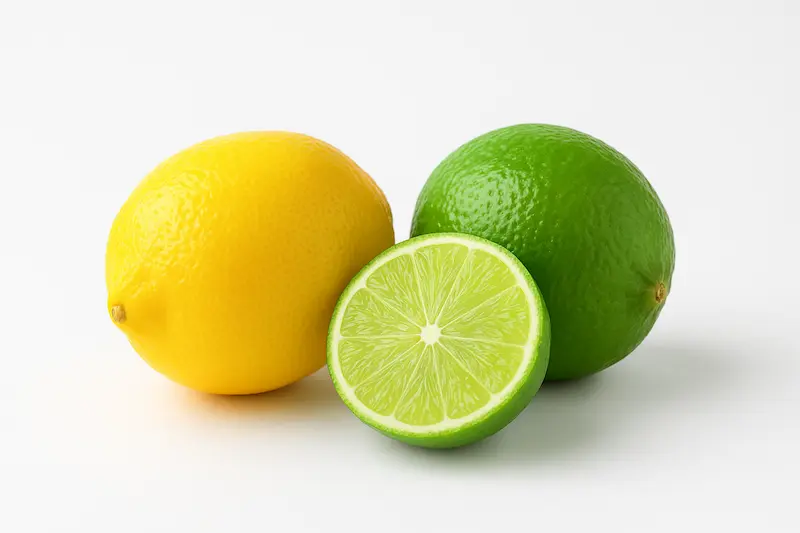Lime vs Lemon: Key Differences, Nutrition & Uses
Published: 25 Oct 2025
Have you ever wondered what the real difference between lime and lemon is? Many people think they are the same fruit or that one is just an unripe version of the other. But that’s not true! While both belong to the citrus family, they have their own unique look, taste, and nutritional benefits.
Lemons are usually bright yellow and a bit larger, while limes are smaller and green. They may look similar at first, but once you taste them, you’ll quickly notice the difference. Lemons have a slightly sweet and tangy flavor, while limes are sharper and more acidic.
In this article, I’ll explain the main differences between lime and lemon, their nutrition facts, and how both fruits can benefit your health. By the end, you’ll know exactly which one to choose for your drinks, dishes, or daily vitamin boost!

Lime vs Lemon (Basic Difference)
When we talk about the difference between lime and lemon, it’s important to start with their origin and nature.
A lemon comes from a small evergreen tree known as Citrus limon, which is native to Asia. On the other hand, lime is not a single species but a group of hybrid citrus fruits that grow in many parts of the world. Most lime varieties come from plants like Citrus aurantiifolia or Citrus latifolia. That means lemons have a specific species, while limes belong to a mixed family of citrus hybrids.
Now, let’s talk about their shape, size, and color. Lemons are usually elliptical or oval-shaped and turn bright yellow when ripe. Limes, however, are typically smaller, rounder, and green. Some lime types may turn slightly yellow when overripe, but they still taste very different from lemons.
A common myth says that limes are just unripe lemons — but that’s not true! They are completely different fruits that grow on different trees. Each has its own flavor, texture, and acidity level. Lemons tend to taste sweeter and milder, while limes have a sharper, tangier bite.
So, even though both belong to the citrus family and often appear together in the kitchen, the difference between lime and lemon lies in their species, color, taste, and use.
Lime vs Lemon Nutrition
When we look at the difference between lime and lemon, their nutrition profiles tell an interesting story. Both are low in calories and high in vitamin C, which makes them great for your immune system. However, lemons usually have a little more vitamin C and citric acid than limes.
According to the USDA National Nutrient Database, here’s how 100 grams of each fruit compares:
| Nutrient (per 100g) | Lemon | Lime |
| Calories | 29 kcal | 30 kcal |
| Carbohydrates | 9.3 g | 10.5 g |
| Protein | 1.1 g | 0.7 g |
| Vitamin C | 53 mg (64% Daily Value) | 29 mg (35% Daily Value) |
| Fiber | 2.8 g | 2.8 g |
| Fat | 0.3 g | 0.2 g |
Key Takeaways:
- 🍋 Lemons have more vitamin C, which helps boost immunity and skin health.
- 🍈 Limes have a slightly higher carbohydrate level but less protein.
- Both fruits are low in calories and fat, making them perfect for healthy diets.
- Lemons are also richer in citric acid, polyphenols, and plant compounds that may help with digestion and detoxification.
So, when comparing the nutritional difference between lime and lemon, lemons take a slight lead due to their higher vitamin C and antioxidant content. But both are refreshing, low-calorie fruits that can add flavor and health benefits to your meals.
Lime vs Lemon Taste
The difference between lime and lemon becomes even more noticeable when you taste them. Both fruits are sour and refreshing, but their flavor profiles are not the same.
Lemons have a milder, slightly sweet flavor with a bright, tangy freshness. That’s why they are often used in desserts, teas, and sauces. Their taste adds balance — not too sharp, not too bitter — making them perfect for both sweet and savory dishes.
Limes, on the other hand, are sharper, tangier, and more acidic. They bring a bold kick of sourness that stands out in drinks, marinades, and spicy foods. Because of their stronger flavor, limes are a favorite in cocktails, especially mojitos and margaritas.
Here’s a quick taste comparison:
| Feature | Lemon | Lime |
| Flavor | Sweet-tart, mild | Tart, sharp, and zesty |
| Acidity | Medium | High |
| Sugar content | Slightly higher | Lower |
| Best used in | Desserts, teas, and sauces | Cocktails, salads, spicy dishes |
Even though both are sour citrus fruits, the difference between lime and lemon makes them suited for different recipes. Lemons bring balance and brightness, while limes add punch and zest.
So next time you’re cooking or mixing a drink, remember — choose lemon for smooth tanginess and lime for bold sour flavor!
Health Benefits of Lime & Lemon
Besides their taste and color, the difference between lime and lemon also shows in how they support your health. Both fruits are rich in vitamin C, fiber, and antioxidants, making them some of the healthiest citrus fruits you can add to your diet. Let’s look at their top health benefits one by one.
1. Boost Immunity
Both lime and lemon are packed with vitamin C, which helps your body fight off colds and infections. Vitamin C boosts the production of white blood cells, your body’s main defense against germs. It also helps protect healthy cells from damage caused by free radicals. So, whether you sip lemon water or lime juice, both strengthen your immune system naturally.
2. Speed Up Healing
Vitamin C is also essential for producing collagen, a protein that helps your skin, muscles, and tissues repair themselves. That means lemons and limes both help your body recover faster from cuts, wounds, or minor injuries.
3. Support Healthy Digestion
Lemons and limes contain dietary fiber, which helps your digestive system stay active and balanced. Fiber prevents constipation and helps reduce bloating. Drinking warm lemon or lime water in the morning can gently cleanse your digestive tract and promote smoother digestion throughout the day.
4. Improve Circulation
Another small but important difference between lime and lemon is in their iron content. Both contain trace amounts of iron, which is essential for making red blood cells. Vitamin C also helps your body absorb iron from plant-based foods, preventing weakness and fatigue.
5. Rich in Antioxidants
Limes and lemons are loaded with antioxidants like flavonoids and polyphenols. These compounds protect your body from oxidative stress and may lower the risk of chronic diseases such as heart disease and cancer.
6. Help in Weight Loss
Both lemon and lime are low in calories and high in fiber, which makes them perfect for a weight-loss diet. The fiber helps you feel full for longer, and the natural acids support metabolism. A glass of lemon or lime water before meals can help control appetite and reduce overeating.
In short, while the difference between lime and lemon lies in their flavor and nutrients, both share amazing health benefits. Adding either of them to your daily routine can help you stay hydrated, energized, and healthy — naturally!
How to Use Lime and Lemon
Once you know the difference between lime and lemon, it becomes easier to choose which one to use in your kitchen or daily routine. Both fruits are incredibly versatile — from adding flavor to meals to being part of beauty and cleaning routines.
In Drinks and Beverages
Limes and lemons are famous for their use in refreshing drinks. Their sharp, citrusy taste adds instant freshness.
- Lemon is perfect for lemonade, teas, and detox water.
- Lime is often used in cocktails, mocktails, and fizzy sodas for its strong, tangy flavor.
For example, a lemon slice in warm water gives you a soothing morning detox drink, while a squeeze of lime brightens up your favorite summer mocktail.
In Cooking
The difference between lime and lemon also shows in cooking.
- Lemons have a milder taste and are commonly used in salad dressings, marinades, sauces, and desserts.
- Limes are often used in spicy or tangy recipes like tacos, curries, and seafood dishes to add a zesty punch.
Their unique acidity balances flavors, reduces bitterness, and brings out the best in both sweet and savory dishes.
In Cleaning and Natural Remedies
Lemon’s natural antibacterial and bleaching properties make it a favorite for home cleaning. You can use lemon juice to clean glass, remove stains, or freshen up your refrigerator.
Limes, on the other hand, are often used in perfumes, body oils, and aromatherapy because of their fresh, energizing scent.
Whether you prefer the sweet tang of a lemon or the bold sourness of a lime, both fruits are powerful, natural ingredients for your kitchen, home, and health. The real difference between lime and lemon is how you choose to enjoy their amazing qualities every day!
Lime or Lemon – Which One is Better?
After exploring all the facts, flavors, and nutrients, you might still wonder which fruit wins the battle — lime or lemon? The truth is, both are amazing in their own ways, but the difference between lime and lemon decides which one suits your needs better.
Lemons have a slight advantage when it comes to nutrition. They contain more vitamin C, antioxidants, and citric acid, which help boost immunity, brighten skin, and support digestion. Their sweeter, gentler taste also makes them perfect for everyday use in cooking, baking, and drinks.
Limes, on the other hand, have a stronger, tangier flavor that adds a refreshing twist to beverages and spicy dishes. They may have a little less vitamin C, but their bold taste and aroma make them a favorite in tropical drinks, seafood recipes, and international cuisines.
So, if you want something nutrient-rich and versatile, go for lemons.
If you prefer zesty flavor and bold freshness, choose limes.
At the end of the day, the best choice isn’t about which one is better — it’s about what flavor you enjoy and how you use it. Both are bright, healthy, and full of life — just like a splash of sunshine in your diet!
Conclusion
Now you know the real difference between lime and lemon — from their looks and taste to their nutrients and health benefits. While they may seem similar at first glance, each fruit has its own charm and unique uses.
Lemons are bright, slightly sweet, and full of vitamin C, making them great for everyday cooking, detox drinks, and natural cleaning. Limes, with their bold and tangy flavor, are perfect for adding zest to dishes and drinks. Both support your immune system, aid digestion, and refresh your body naturally.
If you’ve ever mixed them up before, now you can easily tell them apart — and choose the one that fits your recipe or health goals best. Whether you add lemon slices to your tea or a dash of lime to your mocktail, you’re giving your body a burst of flavor and nutrition.
So, next time someone asks about the difference between lime and lemon, you’ll not only know the facts but also know exactly how to make the most of both!

- Be Respectful
- Stay Relevant
- Stay Positive
- True Feedback
- Encourage Discussion
- Avoid Spamming
- No Fake News
- Don't Copy-Paste
- No Personal Attacks



- Be Respectful
- Stay Relevant
- Stay Positive
- True Feedback
- Encourage Discussion
- Avoid Spamming
- No Fake News
- Don't Copy-Paste
- No Personal Attacks



